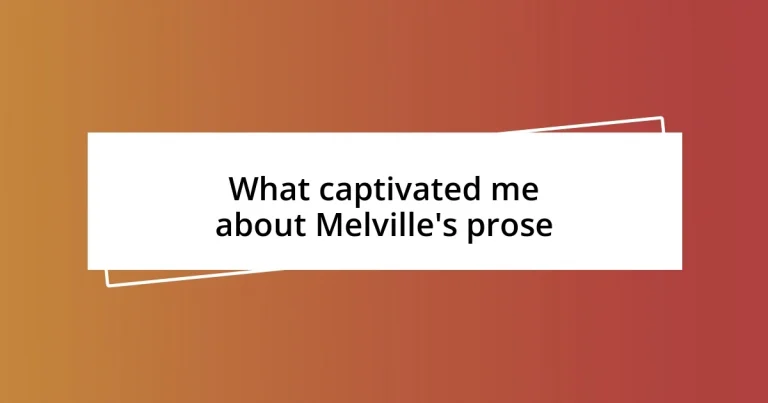Key takeaways:
- Melville’s intricate prose and use of symbolism invite deep contemplation on themes like obsession, existentialism, and societal critique, encouraging readers to reflect on their own lives.
- Key themes in Melville’s works, including isolation, societal critique, and the relationship between humanity and nature, highlight the universal struggles and moral dilemmas that resonate with personal experiences.
- His narrative techniques, such as non-linear storytelling and character-driven introspection, create a profound emotional connection, prompting readers to explore their values and beliefs through the lens of his characters.
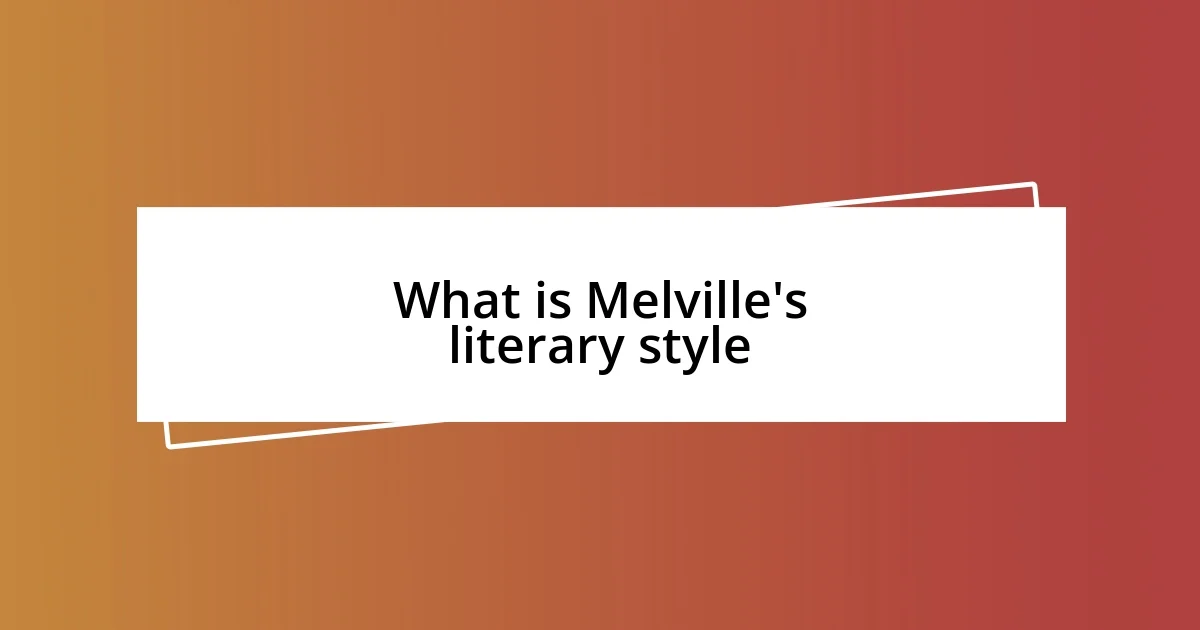
What is Melville’s literary style
Melville’s literary style is marked by its intricate and often ornate prose. I remember the first time I read Moby-Dick; the language drew me in with its rhythm and complexity, making me feel as if I was diving deep into the ocean of his thoughts. His use of symbolism, especially with the iconic white whale, invites readers to ponder deeper meanings, prompting questions about existence and human nature.
What strikes me most about Melville’s work is his ability to blend narrative with philosophical musings seamlessly. He often digresses into profound reflections, which can feel overwhelming at times. Yet, there’s something exhilarating about that depth—it mirrors life itself, don’t you think? These moments of introspection made me feel a connection to the broader human experience, as if Melville was sharing his own epiphanies with me.
His command over language is further enhanced by a masterful use of allegory and irony. The subtle but sharp critiques of society that permeate his prose always leave me wondering about the undercurrents in our own world. I find it fascinating how he manages to evoke a sense of urgency while also encouraging a contemplative pause—an impressive balance that keeps readers engaged on multiple levels.
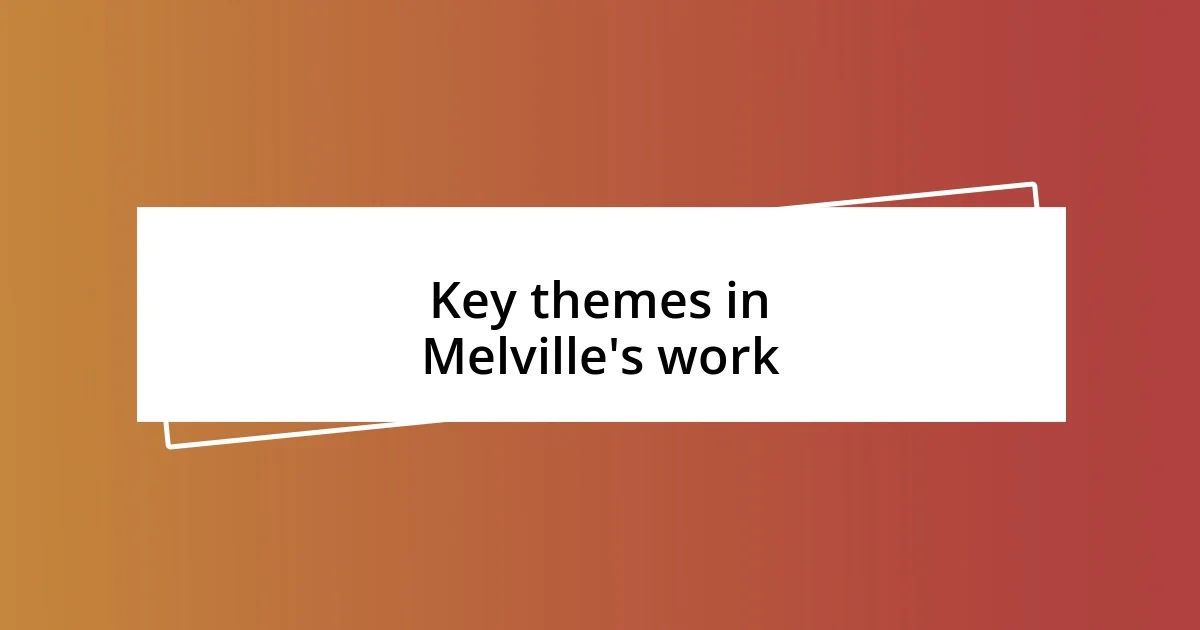
Key themes in Melville’s work
Melville’s works are deeply interwoven with themes of isolation and the human quest for understanding. I often find myself resonating with the profound solitude of characters like Ishmael and Captain Ahab. They epitomize that struggle many of us face—balancing personal ambitions against a backdrop of existential uncertainty. It makes me reflect on my own moments of feeling adrift, searching for meaning in a vast, unpredictable world.
Another significant theme in Melville’s writing is the critique of societal norms and conventions. His portrayal of whaling and the maritime community serves as an allegory for the broader human condition, challenging the status quo and questioning authority. While reading Billy Budd, I felt a stirring in my own convictions as I considered the consequences of moral dilemmas in our lives. It’s as if Melville encourages us to examine our values and their relevance in the face of societal pressures.
Through the lens of nature, Melville also explores the relationship between humanity and the divine. His vivid descriptions of the sea and the creatures within it often left me in awe, fueling my own appreciation for nature’s complexity. There’s an encompassing beauty in his writing that speaks to a connection greater than ourselves, inviting reflection on our place in the universe. Have you ever felt that intimate bond with the world around you? I know I have, especially during moments of quiet contemplation by the shore.
| Theme | Description |
|---|---|
| Isolation | Explores characters’ struggles with loneliness and the quest for understanding. |
| Societal Critique | Challenging societal norms and authority through allegorical narratives. |
| Nature and Divinity | Examines humanity’s relationship with nature and a greater divine presence. |
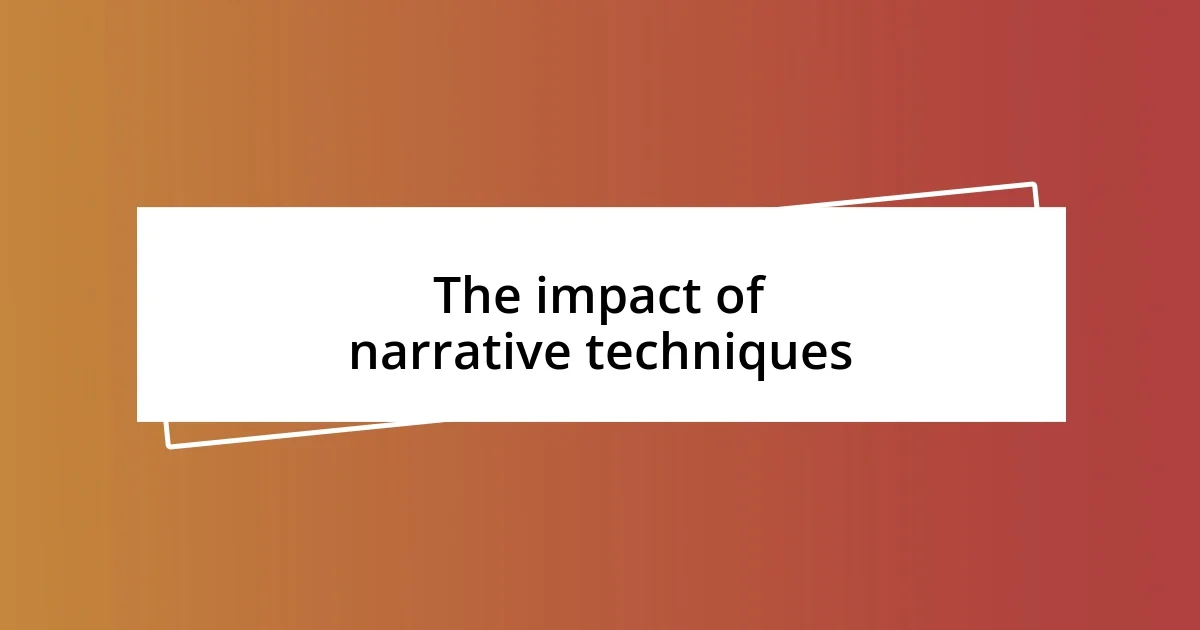
The impact of narrative techniques
Melville’s narrative techniques have a profound impact on how readers experience his stories. One aspect that captivates me is how he often employs a non-linear structure, weaving different timelines and perspectives that challenge conventional storytelling. I remember getting lost in the pages of Moby-Dick, feeling as though each chapter was like a wave, pulling me deeper into the complexities of its narrative. This approach not only enriches the plot but also makes me reconsider the way I perceive time and storytelling itself.
- Melville’s use of first-person narration creates an intimate bond, allowing readers to feel the protagonist’s thoughts and emotions.
- His digressions into philosophical musings provide a layer of depth, prompting me to engage with larger existential questions.
- Through vivid imagery and detailed descriptions, he paints a picture that immerses readers into his world, making emotions palpable and relatable.
The interplay of irony in his prose often catches me off guard, leaving a lingering impact. When reading Bartleby, the Scrivener, I couldn’t help but feel a mix of frustration and sympathy for Bartleby, a character who embodies passive resistance. Melville’s choice to present characters with such conflicting traits encourages me to reflect on my own experiences with compliance and rebellion in everyday life. It’s through these narrative techniques that Melville not only tells a story but also invites me to explore my own perceptions and beliefs.
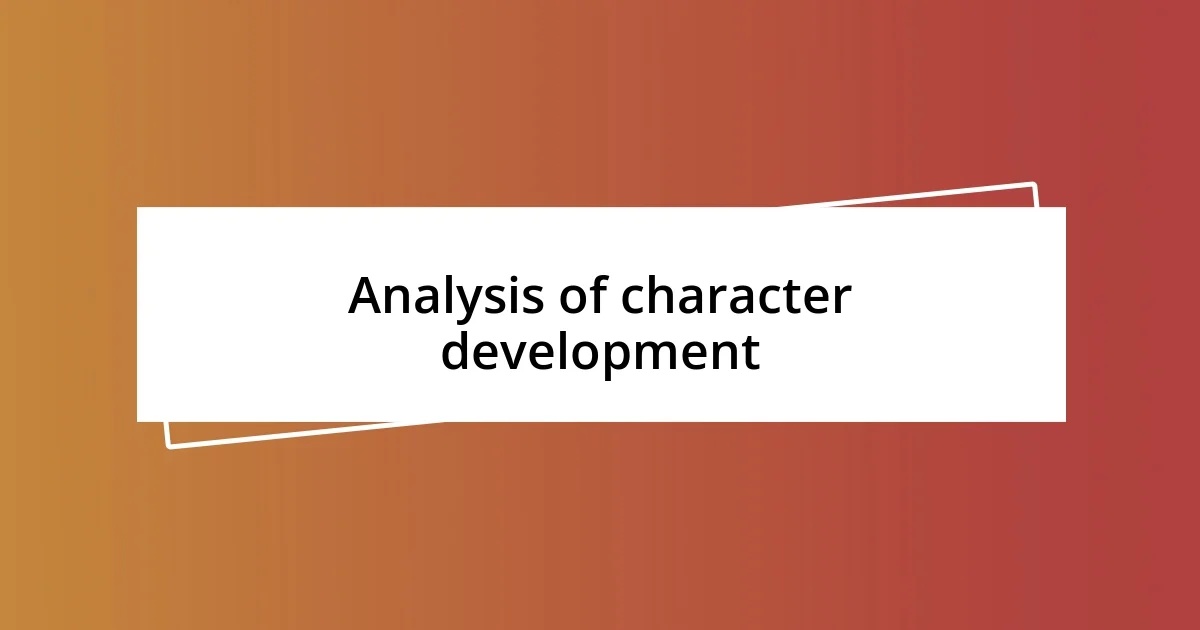
Analysis of character development
Melville’s character development is strikingly layered, revealing the intricacies of human nature through protagonists like Ahab and Ishmael. As I delve into Moby-Dick, I often find myself contemplating Ahab’s obsession with the white whale—it’s more than just a pursuit; it’s a deep, fervent struggle against fate itself. Don’t you feel that urge to confront your own “whale” in life? It’s as if Ahab forces me to reflect on the lengths we go to in the name of ambition, and the costs of such single-mindedness.
What truly captivates me is Melville’s ability to showcase growth through despair. Take Ishmael, for example; his transformation from an inexperienced sailor to a more seasoned figure embodies the lessons life imparts amid turmoil. I remember my own journey of learning through failure—those moments when I felt utterly lost but emerged with a newfound perspective. Doesn’t it resonate with you when characters evolve in ways that mirror our own life experiences?
Moreover, Melville often places his characters in morally ambiguous situations, highlighting their humanity. The internal conflicts faced by Billy Budd force me to grapple with questions of justice and morality. How often have you wrestled with the idea of right and wrong? Reflecting on these moments in Melville’s stories makes me not only question my values but also appreciate the shades of gray that define our choices. It’s this complexity of character that keeps me coming back, eager to peel back the layers and understand what drives these individuals.
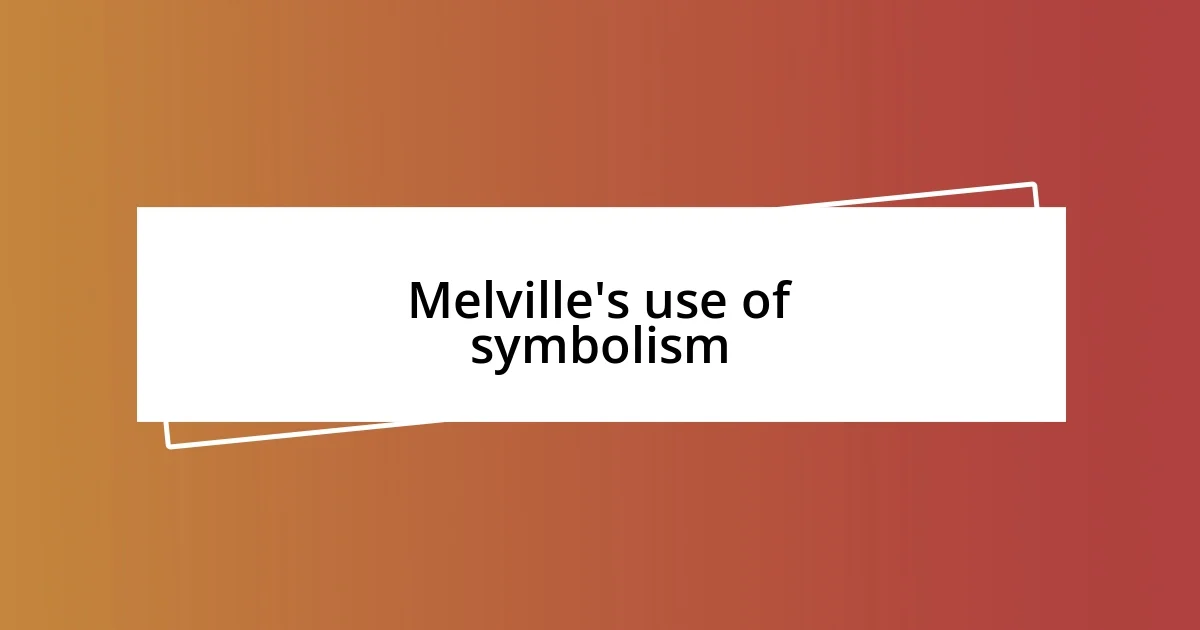
Melville’s use of symbolism
One of the most striking aspects of Melville’s symbolism is how he uses specific objects and elements to convey profound themes. Take, for instance, the white whale in Moby-Dick. To me, it represents not only Ahab’s relentless obsession but also the idea of nature’s unpredictability. Have you ever fixated on something that consumed your thoughts entirely? I have, and it’s almost unsettling to confront the extent to which we allow certain pursuits to overshadow our lives. Melville invites us to question these obsessions and urges us to seek balance in our own aspirations.
Another compelling symbol is the sea itself, which I find intriguing as a representation of the subconscious. It mirrors both the vast potential of human experience and the chaotic struggles we face. When I think about the times I’ve felt lost on my own path, the imagery of the turbulent sea resonates deeply. The waves crashing can evoke a sense of turmoil, yet they also suggest that beneath the surface lies a certain tranquility. Have you ever stood by the ocean and felt that contradiction? Melville captures this duality beautifully, encouraging readers to embrace life’s complexities.
Then there’s the character of Bartleby, who embodies a different type of symbolism—a silent protest against societal norms. His famous refrain, “I would prefer not to,” reflects a profound statement of individuality and resistance. I can’t help but empathize with him, recalling moments when I too felt overstretched by obligations. Do you ever resonate with the idea of stepping back from a demanding world? Melville’s elegant prose makes us reflect not just on Bartleby’s plight but on our own relationship with conformity. It’s through symbolism like this that Melville crafts a rich, thought-provoking landscape that keeps me engaged and pondering long after I’ve closed the book.
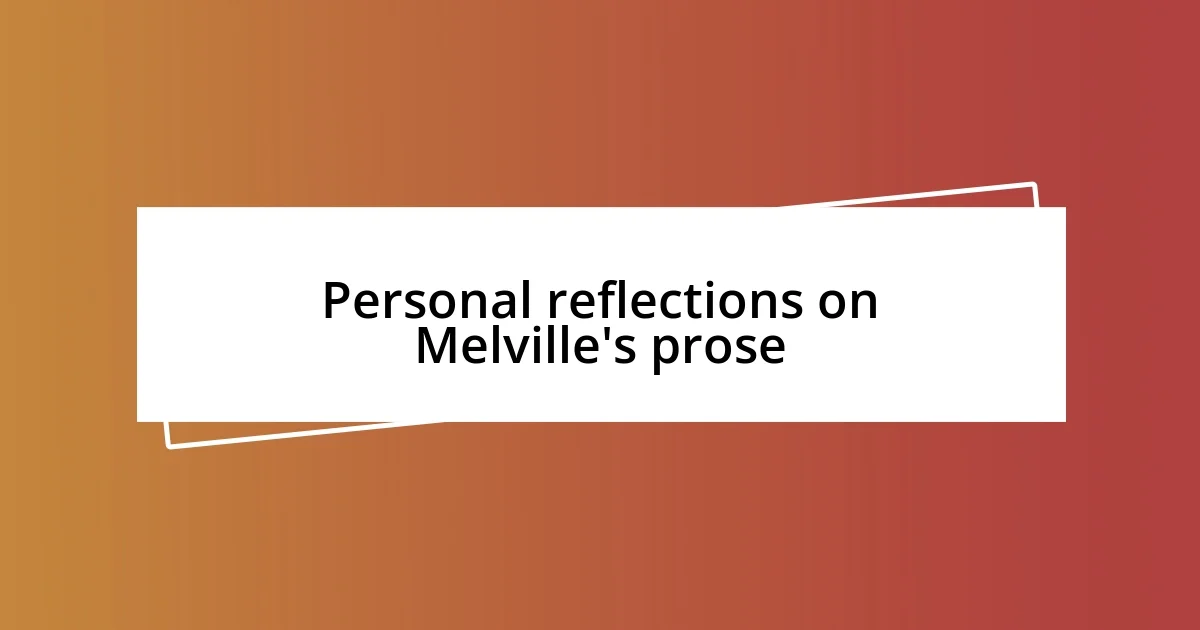
Personal reflections on Melville’s prose
Melville’s prose has a remarkable ability to evoke a range of emotions that resonate with my own life experiences. When I read Moby-Dick, the sense of longing and obsession portrayed through Ahab strikes a personal chord with me. It reminds me of a time when I pursued a goal with such intensity that I almost lost sight of the joys surrounding me. Have you ever found yourself so consumed by ambition that it clouded your vision? That introspection is a gift Melville’s writing offers, prompting us to reflect on our own paths.
I also find Melville’s exploration of existential themes incredibly powerful. The character of Ishmael, grappling with his purpose amid the chaos of the sea, speaks to my own quest for meaning during turbulent times. I recall a period in my life where uncertainty loomed like a storm, and yet, it was within that chaos that I discovered resilience. How often do we realize that our struggles can lead to profound growth? Melville captures that essence flawlessly, reminding me that even in despair, there lies potential for transformation.
Another aspect that enlivens my appreciation for Melville’s work is his willingness to delve into the darker corners of human existence. Billy Budd’s tragic fate makes me question the nature of fairness and destiny. I’ve faced moments when I felt life dealt me an unfair hand, leaving me to ponder whether our efforts ever truly align with outcomes. Have you ever wondered why certain events unfurl the way they do? This moral complexity in Melville’s writing invites me to confront these uncomfortable questions, enriching my understanding of the human experience and connecting us in our shared struggles.
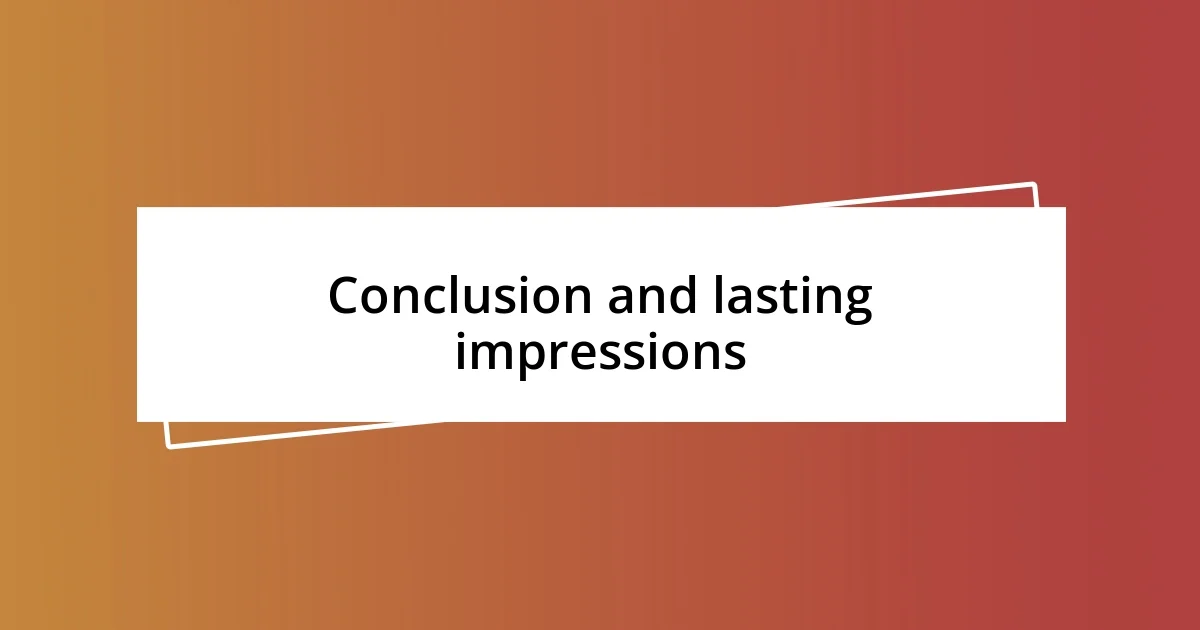
Conclusion and lasting impressions
Melville’s prose leaves a lasting impression on me, stirring reflections long after I’ve turned the last page. When I think about his intricate language and masterful storytelling, I can’t help but feel an undeniable connection to the depths of human emotion. Have you ever encountered a book that seemed to echo your own experiences? For me, that’s what Melville achieves—a bridge to understanding my own complexities through his characters and motifs.
As I look back on the powerful imagery and themes that permeate his work, I realize how profoundly they resonate with my personal journey. The struggles of characters like Ahab and Ishmael mirror the uncertainties I’ve faced in my own life. There were moments when I felt like I was adrift, much like Ishmael amidst the vast ocean. Have you had those moments of feeling lost but discovering strength in vulnerability? Melville’s prose not only captures despair but also illuminates the potential for growth that resides in our darkest hours.
In reflecting on Melville, I find myself questioning the very fabric of existence—the moral dilemmas, the obsessions, the search for meaning. Each reading invites me to explore my values and beliefs more deeply. The complexity of his characters urges me to examine my own responses to life’s challenges. Have you considered how literature shapes our worldview? Melville’s work demonstrates that literature isn’t just an escape; it’s a profound tool for introspection and personal evolution.












